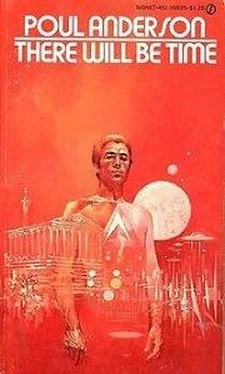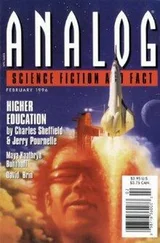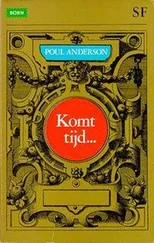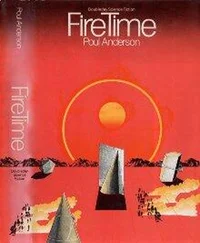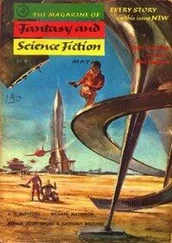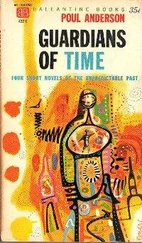Poul Anderson - There Will Be Time
Здесь есть возможность читать онлайн «Poul Anderson - There Will Be Time» весь текст электронной книги совершенно бесплатно (целиком полную версию без сокращений). В некоторых случаях можно слушать аудио, скачать через торрент в формате fb2 и присутствует краткое содержание. Год выпуска: 1972, Издательство: Doubleday, Жанр: Фантастика и фэнтези, на английском языке. Описание произведения, (предисловие) а так же отзывы посетителей доступны на портале библиотеки ЛибКат.
- Название:There Will Be Time
- Автор:
- Издательство:Doubleday
- Жанр:
- Год:1972
- ISBN:нет данных
- Рейтинг книги:5 / 5. Голосов: 1
-
Избранное:Добавить в избранное
- Отзывы:
-
Ваша оценка:
- 100
- 1
- 2
- 3
- 4
- 5
There Will Be Time: краткое содержание, описание и аннотация
Предлагаем к чтению аннотацию, описание, краткое содержание или предисловие (зависит от того, что написал сам автор книги «There Will Be Time»). Если вы не нашли необходимую информацию о книге — напишите в комментариях, мы постараемся отыскать её.
Nominated for Hugo Award for Best Novel in 1973.
There Will Be Time — читать онлайн бесплатно полную книгу (весь текст) целиком
Ниже представлен текст книги, разбитый по страницам. Система сохранения места последней прочитанной страницы, позволяет с удобством читать онлайн бесплатно книгу «There Will Be Time», без необходимости каждый раз заново искать на чём Вы остановились. Поставьте закладку, и сможете в любой момент перейти на страницу, на которой закончили чтение.
Интервал:
Закладка:
“What’d you do?” I asked.
“I found an elderly couple who’d take her in. They were poor, but I could help them financially; they were childless, which made them extra glad, extra kind to her; and he, a scribe, was a scholar of sorts. It worked out well.”
“You made periodic checkups, of course.”
Havig nodded. Gentleness touched his mouth. “I had my own projects going,” he said. “Still, during the next year or so of my lifespan, the next three of Xenia’s, I went back from time to time to visit her. The times got to be oftener and oftener.”
11
THE SHIP was a trimaran, and huge. From the flying bridge, Havig looked across a sweep of deck, beautifully grained hardwood whereon hatches, cargo booms, donkey engines, sun-power screens, and superstructure made a harmonious whole. There was no brightwork; Maurai civilization, poor in metals, must reserve them for the most basic uses. The cabins were shingled. Bougainvillea and trumpet flower vines rioted over them. At each forepeak stood a carven figure representing one of the Trinity-Tanaroa Creator in the middle, a column of abstract symbols; Lesu Haristi holding his cross to starboard; to port, shark-toothed Nan, for death and the dark side of life.
But they were no barbarians who built and crewed this merchantman. The triple hull was designed for ultimate hydrodynamic efficiency. The three great A-frame masts bore sails, true, but these were of esoteric cut and accompanied by vanes which got their own uses out of the wind; the entire rig was continuously readjusted by small motors, which biological fuel cells powered and a computer directed. The personnel were four kanakas and two wahines, who were not overworked.
Captain Rewi Lohannaso held an engineering degree from the University of Wellantoa in N’Zealann. He spoke several languages, and his Ingliss was not the debased dialect of some Merican tribe, but as rich and precise as Havig’s native tongue.
A stocky brown man in sarong and bare feet, he said, slowly for the benefit of his passenger who was trying to master the modern speech: “We kept science after technology’s worldmachine broke down. Our problem was to find new ways to apply that science, on a planet gutted and poisoned. We’ve not wholly solved it. But we have come far, and I do believe we will go further.”
The ocean rolled indigo, turquoise, aquamarine, and aglitter. Waves rushed, wavelets chuckled. Sunlight fell dazzling on sails and on the wings of an albatross. A pod of whales passed majestically across vision. The wind did not pipe in the ears, at the speed of the ship before it, but lulled, brought salty odors, stroked coolness across bare sun-warmed skins. Down on deck, a young man, off duty, drew icy-sweet notes from a bamboo flute, and a girl danced. Their nude bodies were as goodly to see as a cat or a blooded horse.
“That’s why you’ve done a grand thing, Brother Thomas,” Lohannaso said. “They’ll jubilate when you arrive.” He hesitated. “I did not radio for an aircraft to bring you and your goods to the Federation because the Admiralty might have obliged. And… frankly, dirigibles are faster, but less reliable than ships. Their engines are feeble; the fireproofing anticatalyst for the hydrogen is experimental.”
(“I think that brought home to me as much as anything did, the truth about Maurai society in its best days,” Havig said to me. “They were-will not be back-to-nature cranks. On the contrary, beneath the easygoing affability, they may well be more development-minded than the U.S.A. today. But they won’t have the fuel for heavier-than-air craft, anyhow not in their earlier stages; and they won’t have the helium for blimps like ours. We squandered so much of everything.”)
“Your discovery waited quite a few centuries,” Lohannaso went on. “Won’t hurt if it waits some extra weeks to get to Wellantoa.”
(“If I wanted to study the Maurai in depth, to learn what percentage of what Wallis said about them was true and what was lies or blind prejudice, I needed an entrée. Beginning when they first started becoming an important factor in the world, I could follow their history onward. But I had to make that beginning, from scratch. I could pose as a Merican easily enough — among the countless dialects English had split into, mine would pass — but why should they be interested in one more barbarian? And I’d no hope of pretending to be from a semi-civilized community which they had trade relations with …
Well, I hit on an answer.” Havig grinned. “Can you guess, Doc? No? Okay. Through a twentieth-century dummy I acquired a mess of radioisotopes, like Carbon 14. I left them where they’d be safe-their decay must be real-and moved uptime. There I became Brother Thomas, from an inland stronghold which had preserved a modicum of learning. I’d discovered this trove and decided the Maurai should have it, so carted it myself to the coast … You see? The main thrust of their research was biological. It must be, both because Earth’s ecology was in bad need of help, and because life is the sunpower converter. But they had no nuclear reactors to manufacture tracer isotopes wholesale. To them, my ‘find’ was a godsend.”)
“Do you think I’ll be accepted as a student?” Havig asked anxiously. “It would mean a lot to my people as well as me. But I’m such an outsider—”
Lohannaso laid an arm around his shoulder in the Maurai manner. “Never you sweat, friend. First, we’re a trader folk. We pay for value received, and this value is beyond my guessing. Second, we want to spread knowledge, civilization, as wide as we can. We want allies ourselves, trained hands and brains.”
“Do you actually hope to convert the whole of mankind?”
“Belay that! Anyhow, if you mean, Do we hope to make everybody into copies of us? The answer is, No. Mind, I’m not in Parliament or Admiralty, but I follow debates and I read the philosophers. One trouble with the old machine culture was that, by its nature, it did force people to become more and more alike. Not only did this fall in the end — disastrously — but to the extent it succeeded, it was a worse disaster.” Lohannaso smote the rail with a mighty fist. “Damnation, Thomas! We need all the diversity, all the assorted ways of living and looking and thinking, we can get!”
He laughed and finished: “Inside of limits, true. The pirates have to be cleaned up, that sort of job. But otherwise — Well, this’s getting too bloody solemn. Almost noon now. Let me shoot the sun and do my arithmetic, then Terai comes on duty and you and I’ll go have lunch. You haven’t lived till you’ve sampled my beer.”
(“I spent more than a year among the early Maurai,” Havig told me. “Being eager to spread the gospel, they gave me exactly the sort of education I needed for my purposes. They were dear, merry people — oh, yes, they had their share of bad guys, and human failings and miseries, but on the whole, the Federation in that century was a happy place to be.
(“That wasn’t true of the rest of the world, of course. Nor of the past. I’d keep time-skipping to twentieth-century Wellington or Honolulu, and catching planes to Istanbul, and going back to see how Xenia was getting on.
(“When at last I felt I’d reached the point of diminishing returns, as far as that particular future milieu was concerned, I came once more to Latin Constantinople. Xenia was eighteen. Shortly afterward, we married.”)
Of their life together, in the five years of hers which were granted them, he told me little. Well, I haven’t much I care to tell either, of what really mattered between Kate and me.
He did mention some practical problems. They were tripartite: supporting her decently, getting along in the environment to which she was confined, and staying hidden from the Eyrie.
Читать дальшеИнтервал:
Закладка:
Похожие книги на «There Will Be Time»
Представляем Вашему вниманию похожие книги на «There Will Be Time» списком для выбора. Мы отобрали схожую по названию и смыслу литературу в надежде предоставить читателям больше вариантов отыскать новые, интересные, ещё непрочитанные произведения.
Обсуждение, отзывы о книге «There Will Be Time» и просто собственные мнения читателей. Оставьте ваши комментарии, напишите, что Вы думаете о произведении, его смысле или главных героях. Укажите что конкретно понравилось, а что нет, и почему Вы так считаете.
